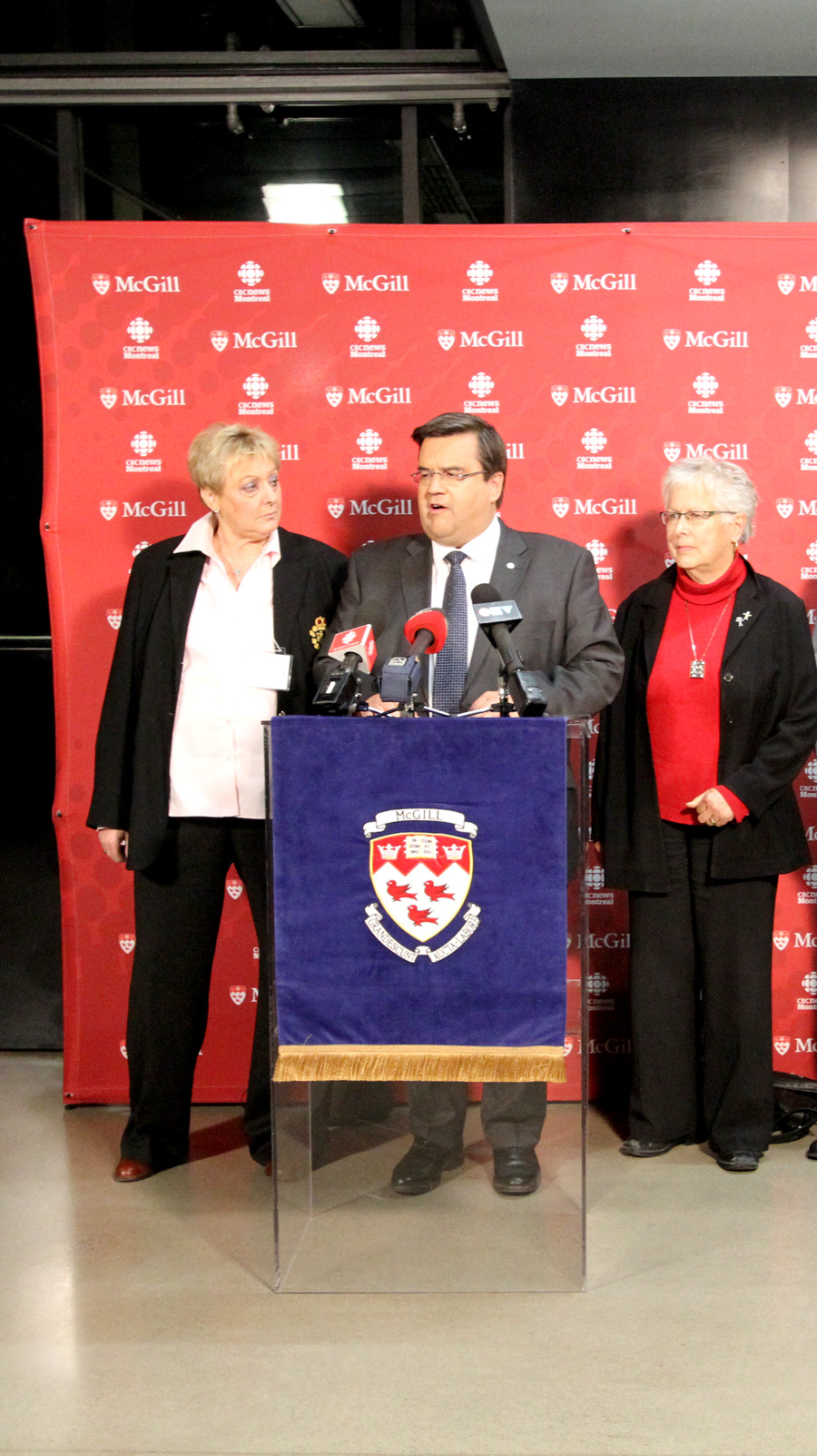On Oct. 22, the four main candidates of the upcoming Montreal mayoral election participated in an English-language debate co-sponsored by McGill University and CBC Montreal. Hosted at McGill’s Tanna Schulich Hall, the debate was attended by over 150 members of both the McGill and Montreal community.
The event featured Marcel Côté, Richard Bergeron, Denis Coderre, and Mélanie Joly, who sought to clarify their platforms for the Nov. 3 election. Topics of debate included their plans to address corruption, revitalize the economy, and improve the transit system.
All four candidates stressed in their opening statements that their administration would be free from corruption—an issue that has caused two mayors to resign in the past year. Joly, who won 24 per cent of votes in an Oct. 15 online CROP poll of 1,001 people, said that her recent entrance into politics would aid her ability to restore integrity and bring accountability to city hall.
“All the information the city has [will] become public, and not only that, within the first hundred days of my administration I’ll make sure to name a Chief Digital Officer that will provide all the information to citizens,” she said.
Côté focused on his experience in management to show that he has solid plans to restructure the city’s political system.
“We need checks and balances in the executive committee which we don’t have now,” Côté said. “We need open government.”
Coderre, who is considered the front-runner of the race with 41 per cent support in the poll, said he and his allies would change the management of city hall. However, Coderre faced questions from the other candidates about ties to the corruption of the past administration.
Bergeron alluded to the fact that Coderre’s team includes 25 individuals from Union Montréal—the governing party of the city from 2001 until November 2012, when it collapsed after extensive corruption charges.

“Can you hope that you will change the situation with the same people that created the real mess we are in right now?” Bergeron asked.
Coderre defended his team, saying that their past associations do not affect their performance now.
“The reality right now is that I refuse to have a society defined by guilt by association,” Coderre said. “Those people are honest; those people are people of integrity.”
Joly also took aim at Coderre by expressing doubt that his proposed creation of an Inspector General position would be sufficient to root out corruption. Citing the example of former New York City mayor Michael Bloomberg’s administration as a model, Joly argued that ensuring every Montrealer easy access to city information and discussions would result in greater accountability.
Coderre said his proposed appointment of an inspector general, who would oversee the investigation of and punishment of public officials involved in corruption, would entail more than just one person monitoring the city.
“It’s not just one person, it’s a department,” Coderre said. “It’s a change of culture, where you have that individual who has the power and who will depoliticize all the process of procurement.”
Each candidate also outlined different goals they would pursue to spur economic growth. Coderre cited his experience with the federal government—as a member of parliament, then as a cabinet minister—as critical to Montreal’s economic hopes, saying that as mayor he could bring in the necessary people to make the city more efficient and to take care of lingering problems, such as demolishing abandoned silos.
While Côté criticized taxes as unnecessarily high, he also said he will not lower them, which drew criticism from other candidates.
“It’s great you’ve made the analysis that taxes are too high but we need solutions, not analysis,” Joly said.
Côté repeatedly emphasized his management experience and what he could do to spur economic development. Naming Montreal the “orange cone capital of the world,” he declared that as mayor he would ensure construction sites would not be left vacant over weekends.
The candidates unanimously expressed dislike of Montreal’s transit system and traffic congestion, but had different visions for potential solutions.
Bergeron argued that the transit system needs to be rapidly improved and expanded before congestion could be reduced. When asked whether a metro to the West Island was a possibility, Joly said a rapid bus system could solve the problem quickly and far more cheaply.
“We came up with a vision of a surface metro, like they do in Bogota and Mexico and Cleveland, which is eight times less [expensive] than a tramway […], forty times less than a Metro, and it has the same impact,” Joly said.
The Charter of Values proposed by the current Parti Québécois government was also a key part of the debate. While every candidate openly opposed the bill, they fell short of challenging it aggressively.
“This is a very divisive fight, Côté said. “I will fight. People know where I stand. But let’s not stoke the fire.”
The other candidates said they will wait to see what the final bill includes and whether or not it would be passed, before taking action.
The next mayor of Montreal will be announced following the election on Sunday, Nov. 3.








